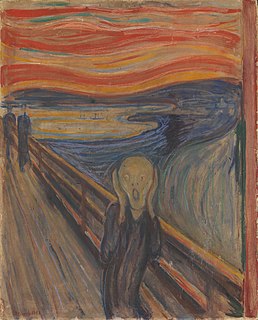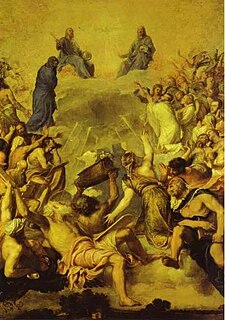Related Research Articles

Expressionism is a modernist movement, initially in poetry and painting, originating in Germany at the beginning of the 20th century. Its typical trait is to present the world solely from a subjective perspective, distorting it radically for emotional effect in order to evoke moods or ideas. Expressionist artists have sought to express the meaning of emotional experience rather than physical reality.

Oskar Kokoschka was an Austrian artist, poet, playwright, and teacher best known for his intense expressionistic portraits and landscapes, as well as his theories on vision that influenced the Viennese Expressionist movement.
Ernst Křenek was an Austrian, later American, composer of Czech origin. He explored atonality and other modern styles and wrote a number of books, including Music Here and Now (1939), a study of Johannes Ockeghem (1953), and Horizons Circled: Reflections on my Music (1974). Krenek wrote two pieces using the pseudonym Thornton Winsloe.

Jonny spielt auf is a German-language opera with words and music by Austrian composer Ernst Krenek about a jazz violinist. The work typified the cultural freedom of the 'golden era' of the Weimar Republic.

Karl V is an opera, described as a Bühnenwerk mit Musik by Ernst Krenek, his opus 73. The German libretto is by the composer.

Schwergewicht, oder Die Ehre der Nation is a burleske Operette with text and music by Ernst Krenek, his Op. 55 and the third of his 1928 one-acters. This satirical skit was provoked by the German ambassador's comment that sports heroes – and not artists – were the true ambassadors of nations, and the title character Ochsenschwanz ("oxtail") is a reference to the boxer Max Schmeling.
Der Diktator is a tragic opera in one act with words and music by Ernst Krenek, his Op. 49 and the first of three one-acters which premiered on 6 May 1928 in Wiesbaden as part of the Festspiele Wiesbaden. The score is inscribed with the date of completion, 28 August 1926.
Leben des Orest is a grand opera in five acts with words and music both by Ernst Krenek. It is his Op. 60 and the first of his own libretti with an antique setting. The score is inscribed with the dates of composition: 8 August 1928 – 13 May 1929, and includes indications of recommended cuts made for the first production. It premiered at the Neues Theater in Leipzig on 19 January 1930, and opened at the Kroll Opera House in Berlin in early March of the same year.
Tarquin is a chamber opera by Ernst Krenek to an English libretto by Emmet Lavery. Written in 1940, it is Krenek's only unpublished opera, though a premiere in German translation took place in 1950 in Cologne.
What Price Confidence? is a chamber opera in nine scenes with music and libretto by Ernst Krenek, his Op. 111. This "little drawing room comedy" is set in London at the turn of the 20th century, and features a protagonist not unlike Max in Jonny spielt auf, as the author points out in a preface; it owes something to Melville as well, as do his next two operas.
The Bell Tower is a chamber opera in one act by Ernst Krenek, his Op. 153. The English libretto by the composer was inspired by the novella by Herman Melville, the events only mysteriously hinted at in the story becoming a point of departure for the explicit dramatic action of Krenek's piece. It was commissioned by the Fromm Foundation and written in 1955–56, receiving its premiere on 17 March 1957 at the University of Illinois.
Cefalo e Procri is a chamber opera in three scenes and a prologue by Ernst Krenek, his Op. 77, begun in 1933 and finished on 3 August 1934. The Italian libretto by Rinaldo Küfferle was commissioned by Universal Edition for the third Venice Festival. The half-hour work was revived at the Gran Teatro La Fenice in Venice in October 2017 as part of a short double-bill with a setting of the 'Lamento di Procri' by Silvia Colasanti, conducted by Tito Ceccherini.

Murderer, the Hope of Women is a short Expressionist play written by the painter Oskar Kokoschka. It focuses more on the actions and appearances of its characters than on their dialogue. Its performance was received with much criticism, as it was a break from classical drama and part of the modernist avant-garde movement in German culture.

Mörder, Hoffnung der Frauen is an opera in one act by Paul Hindemith, written in 1919 on a German libretto by Oskar Kokoschka which he based on his play of 1907. The opera was the first in a triptych of expressionist one-act operas, the others being Das Nusch-Nuschi, and Sancta Susanna. They were the first operas written by Hindemith. The first two were premiered together in Stuttgart on 4 June 1921, all three were performed at the Oper Frankfurt in 1922.
Michael Leinert is a well-known stage director, dramaturg, editor and author. His father, Friedrich Leinert was a respected composer, conductor and Professor of Music in Hannover; Michael Leinert's mother was an operatic and concert singer.
Das geheime Königreich is an opera in one act with words and music by Ernst Krenek, his Op. 50 and the second of three one-acters which premiered on 6 May 1928 at the Hessisches Staatstheater Wiesbaden as part of the Mai-Festwoche Wiesbaden. It is subtitled Märchenoper in 1 Akt and has been called a satirical fairy-tale opera.

Oskar Czerwenka was an Austrian operatic bass and academic teacher. He was a member of the Vienna State Opera from 1951 to 1986, performing 75 roles, including his signature role Ochs auf Lerchenau and premieres of new operas. He was also an author, visual artist and illustrator, and performed in concert. He received several awards, and the state music school in his home town was named after him.
Erik Wirl was a German operatic tenor and actor.

Jürg Thomas Stenzl is a Swiss musicologist, and University professor.
References
- Notes
- ↑ Stewart, pp. 74-76
- Sources
- Amadeus Almanac, accessed 28 August 2008
- Orpheus und Eurydike: Der antike Sagenstoff in den Opern von Darius Milhaud und Ernst Krenek Hans Knoch (Gustav Bosse Verlag 1977)
- Purkis, Charlotte, "Orpheus und Eurydike" in The New Grove Dictionary of Opera , ed. Stanley Sadie (London, 1992) ISBN 0-333-73432-7
- Stenzel, Ernst,(Ed.), Ernst Krenek, Oskar Kokoschka und die Geschichte von Orpheus und Eurydike Jürg Stenzl (Argus 2005)
- Stewart, John L., Ernst Krenek: The Man and His Music. University of California Press, 1991 ISBN 0-520-07014-3 ISBN 0-520-07014-3